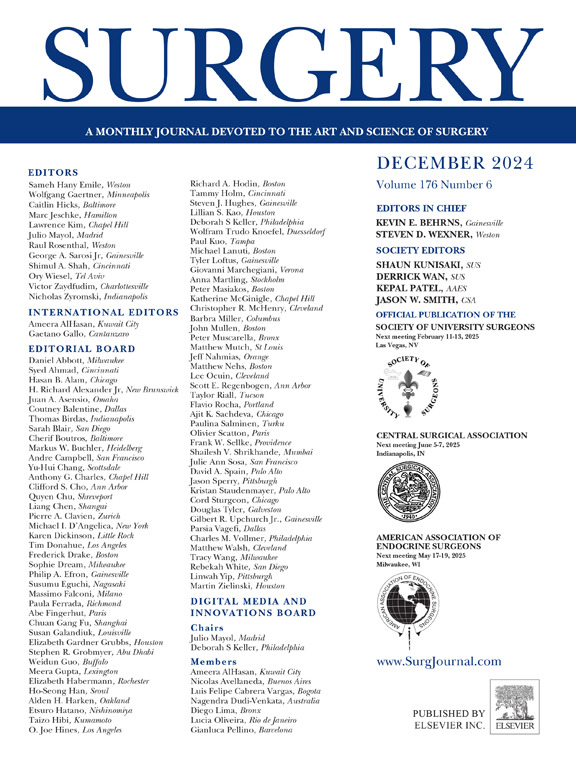Comprehensive assessment of genomic heterogeneity, coalterations, and outcomes of patients with colorectal cancer: An AACR GENIE project analysis
IF 3.2
2区 医学
Q1 SURGERY
引用次数: 0
Abstract
Introduction
Colorectal cancer remains a leading cause of cancer mortality in the United States and can be characterized by racial and sex-based disparities. The objective of the current study was to characterize the genomic heterogeneity of colorectal cancer among diverse demographic groups, assess coalteration patterns and their impact on long-term outcomes among patients with colorectal cancer.
Methods
Data from the American Association for Cancer Research GENIE registry were analyzed to assess genomic alterations in colorectal cancer. The cohort included 20,542 samples from 19,542 patients, stratified by race or ethnicity, sex, and age of onset (<50 years for early-onset colorectal cancer). Genomic alterations and coalterations among the 48 most prevalent loci were evaluated for any association with overall survival in an external Memorial Sloan Kettering Cancer Center cohort.
Results
Among 19,542 patients, KRAS mutations were more prevalent among Black patients (57.1%) compared with White (41.8%) and Asian (43.4%) patients (P < .001), whereas TP53 alterations were more frequent among Asian (75.6%) than White (69.9%) or Black (71.9%) patients (P < .001). Coalterations with KRAS were associated with improved survival over KRAS alteration alone, a pattern less-frequently observed among Black patients. Sex-based differences were also observed, with BRAF mutations more prevalent among females (14.6% vs 9.7%; P < .001) and TP53 mutations more common among males (73% vs 70.5%;P = .009). Although KRAS alterations tended to co-occur with alterations in ATM, ARID1A, CREBBP, FAT1, KMT2B, and KMT2D genes among patients with “early onset” colorectal cancer (all p & q < 0.05), alterations of these gene pairs were mutually exclusive among individuals with late onset colorectal cancer.
Conclusion
Genomic alterations and coalteration patterns varied relative to race/ethnicity, sex, and age at disease onset. Differences in genomic alteration patterns of colorectal cancer somatic tumor cells are an important consideration to help address disparities among different demographic groups.
结直肠癌患者基因组异质性、共变和预后的综合评估:AACR GENIE项目分析
在美国,结直肠癌仍然是癌症死亡的主要原因,其特点是存在种族和性别差异。本研究的目的是表征不同人群中结直肠癌的基因组异质性,评估共改变模式及其对结直肠癌患者长期预后的影响。方法分析美国癌症研究协会GENIE登记处的数据,评估结直肠癌的基因组改变。该队列包括来自19542名患者的20542份样本,按种族或民族、性别和发病年龄(早发性结直肠癌为50岁)分层。在外部纪念斯隆凯特琳癌症中心队列中,评估了48个最常见位点的基因组改变和共改变与总生存的关系。结果在19542例患者中,KRAS突变在黑人患者(57.1%)中较白人(41.8%)和亚裔(43.4%)患者更为普遍(P <;.001),而TP53改变在亚洲人(75.6%)中比白人(69.9%)或黑人(71.9%)患者更常见(P <;措施)。与单独的KRAS改变相比,KRAS共改变与生存率的提高相关,这种模式在黑人患者中较少观察到。基于性别的差异也被观察到,BRAF突变在女性中更为普遍(14.6% vs 9.7%;P & lt;.001)和TP53突变在男性中更为常见(73% vs 70.5%;P = .009)。尽管在“早发性”结直肠癌患者中,KRAS的改变往往与ATM、ARID1A、CREBBP、FAT1、KMT2B和KMT2D基因的改变同时发生(所有p &;问& lt;0.05),这些基因对的改变在晚发性结直肠癌个体中是互斥的。结论基因组改变和共改变模式因种族/民族、性别和发病年龄而异。结直肠癌体细胞肿瘤细胞基因组改变模式的差异是帮助解决不同人口群体差异的重要考虑因素。
本文章由计算机程序翻译,如有差异,请以英文原文为准。
求助全文
约1分钟内获得全文
求助全文
来源期刊

Surgery
医学-外科
CiteScore
5.40
自引率
5.30%
发文量
687
审稿时长
64 days
期刊介绍:
For 66 years, Surgery has published practical, authoritative information about procedures, clinical advances, and major trends shaping general surgery. Each issue features original scientific contributions and clinical reports. Peer-reviewed articles cover topics in oncology, trauma, gastrointestinal, vascular, and transplantation surgery. The journal also publishes papers from the meetings of its sponsoring societies, the Society of University Surgeons, the Central Surgical Association, and the American Association of Endocrine Surgeons.
 求助内容:
求助内容: 应助结果提醒方式:
应助结果提醒方式:


